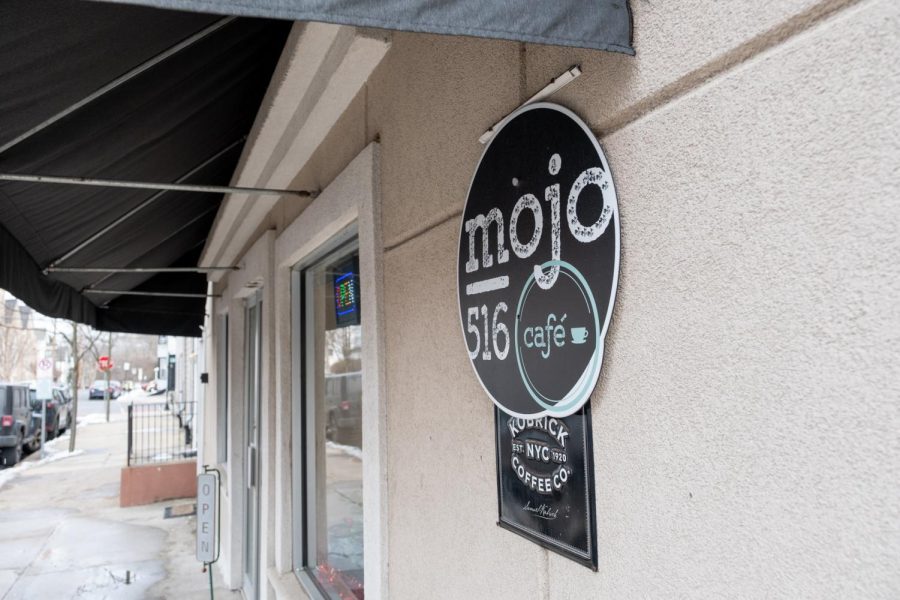Why are there so few restaurants on College Hill?
Photo by Caroline Burns for The Lafayette
The owner of Mojo, Lambros Galanos explained the difficulties of owning a business during the pandemic but called for more restaurants on College Hill. (Photo by Caroline Burns ’22 for The Lafayette)
February 18, 2022
There is a dearth of dining on College Hill, and students are feeling it.
Some Lafayette students are frustrated about a lack of restaurants to choose from near and around campus. For Elias Groff ‘23, the problem is a “lack of an actual sit-down, nice places” near campus.
“I think, and a lot of my friends agree with this, the fact that we have to walk down the hill to all those restaurants that we want to go to sort of destroys the fact that we’re going to a nice place because it takes up a lot of our time to do something,” Groff said.
“It’s definitely inconvenient to go down the hill for just a dining experience,” Ileanna Kufner ‘23 said.
Kufner acknowledged that the college made an effort to diversify dining options with the opening of the college-owned Trolley Stop in the spring of 2021.
“The idea was good, like a twenty-four-hour diner, but they were really understaffed,” she said.
Groff would have preferred a dining location that is unaffiliated with the college.
“Having something outside of a campus-owned spot would be really nice,” Groff said.
Roxane Bolon ‘23 echoed these sentiments, citing the closure of Campus Pizza last summer.
“Honestly I feel trapped. I feel like there’s nowhere I can go to have a good meal unless I go downtown,” Bolon said.
Campus Pizza, a restaurant adored by Lafayette students for decades, was one of many dining spots on the hill to close its doors due to Covid. Morici’s Ristorante and Cosmic Cup were also among the casualties of the pandemic.
Lambros Galanos, who owns Mojo 516 Cafe, a popular coffee spot for Lafayette students on March Street, also owned Campus Pizza. He said that the pandemic has had a profound effect on his business operations.
As for a lack of off-campus dining options, Galanos said “it’s going to be nice if you open more business up there [on Cattell Street].”
“You need some more places on Cattell Street…a little more for the kids to get something to eat,” he said. “They get a choice.”
J. Brown, the communications director of the College Hill Neighborhood Association (CHNA), addressed some of the difficulties that come with acquiring and operating a business during the coronavirus pandemic.
“Ultimately, trying to open any business right now is beyond treacherous,” he wrote in an email. “The pandemic has been devastating.”
He was speaking from experience. Brown, who owns a business in Bethlehem, discussed what trying to open a business on College Hill was like.
“What I discovered was that, even though there are a number of storefronts that have been empty for a long time, the landlords were absent, not interested in renting or were asking for absorbent rents that made it not viable,” he wrote.
Brown’s assessment of landlords’ unwillingness to lease might explain why the lineup of businesses around campus has not returned to pre-pandemic levels.
“The only way it is going to happen on College Hill is if the people who own the properties want to [get] something good for the neighborhood,” Brown wrote. “If it’s only about a return on their real estate investment or a tax break then the possibilities will remain unrealized.”
Brown’s views are his own and not representative of the CHNA.
There are, however, a few bright spots. The storefront that was Morici’s Ristorante, at 218 Cattell Street, is now home to Hana Sushi and Teppanyaki.
Additionally, Galanos and his wife and business partner Katherine Galanos, will be broadening dining options on College Hill with the opening of a new Greek restaurant at 323 Cattell Street within the next couples of months.
























































































































John Colatch • Feb 24, 2022 at 8:14 am
“Absorbant” rents? How do those work? Hopefully, they’re not exorbitant!